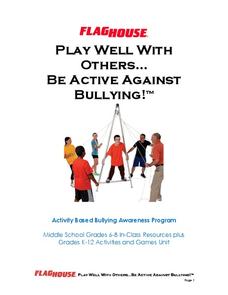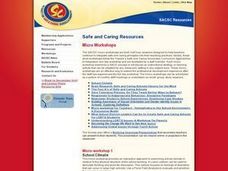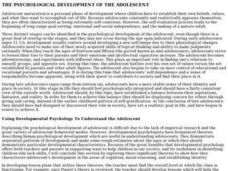American Psychological Association
Top 20 Principles from Psychology for PreK–12 Creative, Talented, and Gifted Students’ Teaching and Learning
Who knew getting a better grasp on learning and psychology requires understanding only 20 principles? The resource, especially ideal for high school Psychology, discusses 20 important principles that debunk common myths and provide...
College Board
AP® Psychology Cognition and Language
I can remember what happened five years ago, but I can't recall what I did last week! High school psychology students analyze how memory, cognition, and language impact one another. Hands-on activities, memory exercises, and research...
American Psychological Association
A Career in Psychology
Could you have a future therapist in your high school Psychology classroom? Find out by assigning the class to complete an activity where they discover more information about what a career in psychology looks like. Resources they view...
American Psychological Association
How Psychology Benefits Society
How do people form their opinions about certain social issues? Scholars research current global issues to find out how psychology plays a role in swaying thoughts. Using blogs, writings, and presentations, they uncover why people think...
University of North Carolina
Psychology
Psychology, the scientific study of the human mind and behavior, is a popular major for many college students. An informative handout outlines common assignments in psychology courses. Scholars see how to design a research proposal,...
Curated OER
The Psychology Teacher's Resource Guide
The activities in a comprehensive teacher's resource guide provides budding psychologists with opportunities to design experiments to study behavior, apply their knowledge of research variables, critique online behavior surveys, and much...
US Department of Homeland Security
Psychological First Aide (PFA) for Students and Teachers
Listen, protect, connect! Using the resource, teachers learn how psychological first aid helps scholars adjust after a crisis or school emergency. They discover how to observe changes in pupils' school performance, listen and offer...
College Board
AP® Psychology: Teaching Statistics and Research Methodology
Psychologists use statistics? Scholars investigate the research behind the methodology of statistical analysis. Using hands-on practice, case-studies, and scatterplots, they complete various tasks to understand the very roots of high...
American Psychological Association
Using Psychological Perspectives to Answer Questions on Behavior
Perspective is everything when it comes to assessing human behavior. Class members examine a series of statements and identify the perspective represented by each to demonstrate their understanding of different psychological perspectives.
American Psychological Association
Activities from the Society for the History of Psychology Website
The Society for the History of Psychology provides a list of teaching activities designed to acquaint learners with the various fields of psychology and introduce them to prominent psychologists. Details for several of the activities are...
College Board
2013 AP® Psychology Free-Response Questions
A school district is trying to get its learners to read more, but what is the best way to motivate them? A scenario investigates whether the district should use pizza coupons to encourage literacy. Other practice questions from College...
Flag House
Play Well with Others…Be Active Against Bullying!
Bully-free is the way every school should be! How can you help create that kind of culture in your school? A well-written teacher's guide containing lessons for grades 6-8 may be just the ticket. Each unit, separated by grade level,...
American Psychological Association
Developing Adolescents
Why to young people act the way they do? Scholars investigate the stages of adolescent development incorporating high school psychology techniques. Using research from the American Psychological Association, they uncover the five areas...
American Psychological Association
Psychology Goes to Madison Avenue
As part of a study of well-known psychologists, class members create a name, a business logo, an advertisement for TV, online, radio, or print, and a pamphlet for the business run by one of the psychologists on a provided list. An...
Maryland Department of Education
The Concept of Identity Lesson 4: The Psychological Approach
Readers apply Sigmund Freud's theories of the unconscious mind and the psychological approach to literary criticism to analyze and evaluate the relationship between two characters in A Separate Peace.
American Psychological Association
Facebook Activity
Imagine if Sigmund Freud or Charles Darwin had a Facebook page. As part of a study of major historical figures in the field of psychology, class members are assigned a psychologist and design a mock Facebook page that includes such items...
College Board
2010 AP® Psychology Free-Response Questions
A pep rally may seem like a simple ritual for a high school, but there are a number of psychological factors operating behind the scenes. Learners flesh out these features using a case study from College Board. A second prompt offers...
College Board
AP® Psychology: Special Focus - The Brain, the Nervous System, and Behavior
How does the brain send signals to the rest of the body? Scholars research and analyze the functions of the brain and the central nervous system in the human body. Using hands-on activities, reflections, and research, they begin to...
American Psychological Association
Statistical Significance
Our survey says ...! High school psychology scholars analyze how people create surveys. Three different scenarios help them discover the meaning behind statistical significance. Armed with new knowledge, novice psychologists uncover what...
American Psychological Association
Sampling or Assignment?
Each discipline has its own vocabulary, terms it uses to identify key concepts and processes. Sample, to psychologists, refers to those people (participants) a researcher is studying, while assignment refers to the treatment conditions...
Curated OER
School Climate
Students examine school climate in relation to the physical structure of the school building. A Luann cartoon can be used to stimulate thinking and promote discussion which focuses on feelings of alienation that can occur in large high...
Curated OER
Identifying Bullies
Young scholars investigate human behavior by defining bullies. In this psychology lesson, students read the book Just One Flick of a Finger, and discuss why bullies act out in front of other children. Young scholars investigate actions...
Social Media Toolbox
Cyberbullying
What can we do to make our school community more aware of cyberbullying? From The Social Media Toolbox, instructional activity 10 of 16 takes on the tough topic of bullying. Learners research cyberbullying through online research, then...
Curated OER
The Physiological and Psychological Development of the Adolescent
Students examine the life of a teenager from their own perspective and an adult's. In groups, they focus on the biological changes and how they are different in a girl and a boy. Individually, they write a paper about these changes and...
Other popular searches
- High School Psychology
- School Psychology Motivation
- School Psychology Freud
- School Psychology Worksheets
- School Psychology Memory
- School Psychology Aggression
- School Psychology Learning
- High School Psychology Brain
- School Psychology Agression
- School Psychology Freud Id
- %2522 School Psychology

























